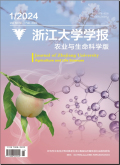10.3321/j.issn:1008-9209.2000.02.004
油菜小孢子秋水仙素直接处理增加纯合两倍体植株频率
@@ Techniques for microspore culture of Brassica napus have been improved rapidly, and embryogenesis has been achieved in a wide range of genotypes. Plants regenerated from microspore-derived embryoids can be haploid, diploid or polyploid. From rapeseed microspore culture it is reported that 70%-90% of regenerated plants are haploid. The usual methods of chromosome doubling involve soaking roots (most common) or whole plants in a colchicine solution, or culturing plantlets in colchicine-containing medium in the greenhouse. Other alternatives are injecting colchicine into the secondary buds or applying colchicine-soaked cotton plugs to axillary buds.
油菜、小孢子、秋水仙素、处理、植株、频率、microspore culture、Brassica napus、methods of、range of
26
S6(园艺)
Swedish SLR;German BASF;中国奖学金会基金97833065
2004-01-08(万方平台首次上网日期,不代表论文的发表时间)
共2页
125-126








